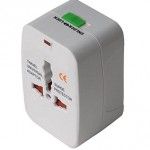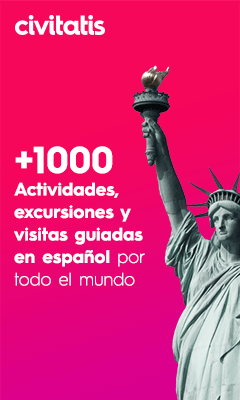I thought about writing this article every time I had to pack my suitcase before heading to a new contract. Each time, the same dilemma arose: what should I pack? This is not an easy task considering that we need clothes and accessories for six months (or more) in different climates. Since I’d received several messages asking me to write something on this subject, here are my suggestions.
PACKING FOR A NEW CONTRACT
It is essential to review the ship’s itinerary that we are going to sign on. Will you stay six months in the Caribbean? Or are you going to cross to Europe in May? It is very important to keep this in mind. Sometimes cruise lines make last minute changes. Maybe you just arrived to your new ship in Miami and just few days later the company asks you to take a plane to catch another ship in Rome. It could happen.
It is also important to consider the culture of the places you will visit. For example, in Egypt I chose to wear dresses with sleeves and a scarf on my head to cover my blond hair to avoid attention.

The size of the cabin is small. Remember that! In the worst-cases scenario, your cabin will be about 3×4 meters. This space is for two crewmembers and it includes a desk, two closets, a small refrigerator, without considering the toilet, which size varies from ship to ship, but it’s still quite small. Here is a link of a cabin from Carnival Victory.
So I made a list of all the thing I think you should bring with you:
01 | Uniform

Your uniform depends on your position on board. I recommend you to find out in advance what the uniform looks like and carry some extra things with you. For example, if you have to wear white shirts, bring another pair. I took not-so-new clothes with me. They still looked very presentable, but I put them in the thrash at the end of my contract. I rather have some extra shirts so I could avoid doing laundry very often. The washing machines are always busy and you waste a lot of precious time waiting for one to be available. In some companies, laundry service is included for a small fee.
As a sales assistant I had to wear black/navy pants or a skirt and a jacket, but I chose to use my own uniform because the one I received was very synthetic and American sizes are very big. Working as a purser I had a lot of uniforms: one for formal events, one for the reception desk, a white one —as in the Love Boat— and I think there was a winter one too that I never got and I froze my ass to death in Scotland. We needed to have an extra suitcase for everything.
02 | Clothes for different climates and emergencies
Don’t take a lot of stuff with you. Try to wear matching clothes, you will have more options to dress with less garments. Think about the weather: one day you could be freezing in Alaska, the next one bathing under the sun in San Diego. Just put a jacket, a pair of thick pants and a couple of vests. If you go to Europe, you can find very cheap clothes for men and women at stores like H&M and Primark –my favorite–. And by emergency clothes I also mean a killing outfit and a costume. Seriously, there are always great parties on board.
03 | Shoes for work

Once again, the type of shoes you will use depend on your job. But in general, everybody use black closed shoes with low heels shoes. In some positions, safety shoes are required. Or even white shoes if you wear a white uniform. As a shoppie and as a purser I had to stand on my feet for very long hours, so those Crocs totally saved my life! Leave glamour at home, or for the crew bar, your feet will be grateful.
04 | Toiletries
I think the best is to take just a few things for the first two weeks in which you can hardly get off at port. If you’re going to embark in the United States, I recommend you to buy everything there, it’s so much cheaper, especially in supermarkets like Target and Walmart. You can also find toiletries and other stuff at a somewhat higher price in pharmacies like Walgreens, CVS and Rite AID.
I always carry a small container with chlorine or something to clean the cabin’s toilet. There are very #$@! people who end their contracts, get off the ship and leave the cabin as a mess. You can also get these products on board, in the housekeeping department.
05 | Lugagge
Ideally, bring maximun three: a large suitcase, a medium one (or small if you prefer) and a bag, which you can put inside the big suitcase. In most cabins, you can fit luggage under the bunk bed. When you live in such tight spaces, being organized is a must.
If you travel to the US, you can take two bags of 23 kilos each, but in Europe you can only take one. In theory, crew members have certain guarantees with luggage, but I would not trust that. I have had to pay for extra weight and I was not reimbursed.
06 | Travel towel

A what? Yeah, a towel! I like to be prepared and it happened to me so many times that I didn’t get a new towel when I signed on a ship. Before disembarking, every crew member has to get fresh towels and bedsheets for its replacement. But guess what? Usually they don’t! Maybe it is as easy as go to the laundry and ask for one, but it is open at certain hours when you are not really thinking on it. I don’t know, maybe I’ve been unlucky. So in order to avoid this situation, I bought myself a travel towel. You might think this is not mandatory to bring –and you are right–, but they are cheap (about 25 USD in Walmart), small and they dry really fast, so why not. Specially for emergencies I take it with me to every ship and every trip I take. You can always use it for the beach.
07 | Underwear and socks
Take a LOT. As I said before, the more you avoid the laundry, the better.
08 | Small sleeping bag
As the towel, this is not really that necessary, but again, I often don’t receive new sheets on my sign on my first day on board or donn’t have enough time to go an get them when the main laundry is open –believe me, the first day you will not have any time off–. My sleeping bag is really small so I take it everywhere as well.
09 | Kettle

Ok, I know. This is a personal favourite. If you are a tea fan as me, you will know how useful these are. But be careful, this things are, in theory, not permitted onboard. Some companies do allow them but they have to have a switch off. I take mine everywhere because it’s small –one liter– and as I said, I love tea. And I can also prepare some noodles. If Security take it from you, just ask it back at the end of your contract, but at least you tried. I highly recommend you to read the rules of each cruise company, a paper that you should get at the beginning of your contract. When I bought my beloved kettle in Scotland and went through the Caribbean Princess’s security, the officer tried to take it from me. What he didn’t know was that my switch-off-kettle was allowed, so I showed him the rules. So I could drink my tea everyday.
10 | First aid kit
Bring only the essentials. Usually, outside the ship’s infirmary they have Ibuprofen, motion sickness pills and condoms. Always take charcoal pills and, ladies! please bring pain medication for those days of the month, also for sore throat and a small alcohol bottle.
11 | Adapter
 In most ships they have plugs for 110 volts and 220 volts in the crew cabins. In order to avoid a bad situation is better to buy a multi adapter. Just keep in mind that an adaptor is not the equivalent of a voltage converter. If your hairdryer is 110 volts , you must use the American plug, otherwise it will get burn.
In most ships they have plugs for 110 volts and 220 volts in the crew cabins. In order to avoid a bad situation is better to buy a multi adapter. Just keep in mind that an adaptor is not the equivalent of a voltage converter. If your hairdryer is 110 volts , you must use the American plug, otherwise it will get burn.
If you still have doubts about what to pack for your new contract, do not hesitate to ask in the comments below! This blog is to help you.
If you liked this article, please share.
Want to know more about shiplife? Check The Truth About Cruise Ships.












